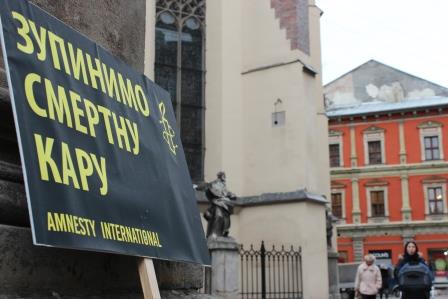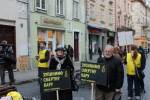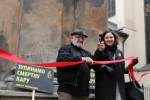Ukrainian activists of “Amnesty International” held an action against the use of the death penalty in Belarus
-

- Lviv. "AI" action against the death penalty in Belarus
On 3 December “AI” activists held a street action in Lviv to
condemn the ongoing use of the death penalty in Belarus and support
Liubou Kavaliova, whose son was executed in March 2012 in Minsk.
At
1 p.m. participants of the action gathered near the Boyims Chapel
with the posters “Let's stop the death penalty!” and encouraged
people to take photos with ribbons of different colors.
“Like
many Ukrainians, I am concerned with the fate of our brethren from
Belarus. Today we have come out of an action in order to call on the
Belarusian authorities to abolish this inhuman punishment with
death,” stated one of the activists, Natallya Shalata. “We also
organize a photo action in support of Liubou Kavaliova. All
volunteers can take photos with a ribbon which symbolizes the
ceaselessness of life. We will aggregate the obtained photos in a
collage and then pass them to Liubou.”
Moreover, the
activists took part in the illumination of the Boyims Chapel at 5
p.m. within the framework of the universal action “Cities for Life,
cities against the death penalty”. The light by which temples are
illuminated this day has a symbolical meaning. All participants of
the actions express the hope that this light will reach the parts of
the world where the death penalty is still used.
“The death
penalty is the deliberate deprivation of life on the part of the
state, which violates the right to life, declared by the Universal
Declaration of Human Rights. This is an extremely violent and inhuman
kind of punishment, irrespective of the methods used – be it
electric chair, hanging, asphyxiation, stoning, shooting, deadly
injection or anything else,” emphasized the executive officer of
the “AI” on the former USSR territory Tetyana Mazur. “Belarus
remains the last henchman in Europe and on the former USSR territory.
The extreme penalty is surrounded with secrecy. Death convicts are
executed by a shot in the back of the head, and sometimes it takes
more than one bullet. The bodies are not passed to the relatives, who
are often informed about the execution post factum. Meanwhile, the
place of the burial is kept in secret, which brings even more grief
to the families.”






